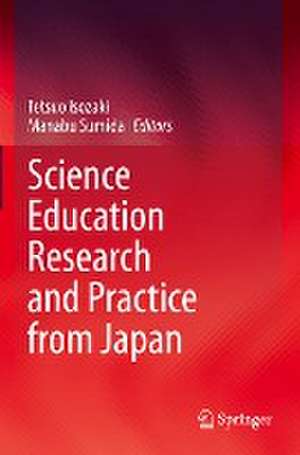Science Education Research and Practice from Japan
Editat de Tetsuo Isozaki, Manabu Sumidaen Limba Engleză Paperback – 21 iul 2022
| Toate formatele și edițiile | Preț | Express |
|---|---|---|
| Paperback (1) | 996.59 lei 6-8 săpt. | |
| Springer Nature Singapore – 21 iul 2022 | 996.59 lei 6-8 săpt. | |
| Hardback (1) | 1002.05 lei 6-8 săpt. | |
| Springer Nature Singapore – 20 iul 2021 | 1002.05 lei 6-8 săpt. |
Preț: 996.59 lei
Preț vechi: 1215.35 lei
-18% Nou
Puncte Express: 1495
Preț estimativ în valută:
190.69€ • 199.10$ • 157.83£
190.69€ • 199.10$ • 157.83£
Carte tipărită la comandă
Livrare economică 04-18 aprilie
Preluare comenzi: 021 569.72.76
Specificații
ISBN-13: 9789811627484
ISBN-10: 9811627487
Ilustrații: XXII, 199 p. 50 illus., 25 illus. in color.
Dimensiuni: 155 x 235 mm
Greutate: 0.35 kg
Ediția:1st ed. 2021
Editura: Springer Nature Singapore
Colecția Springer
Locul publicării:Singapore, Singapore
ISBN-10: 9811627487
Ilustrații: XXII, 199 p. 50 illus., 25 illus. in color.
Dimensiuni: 155 x 235 mm
Greutate: 0.35 kg
Ediția:1st ed. 2021
Editura: Springer Nature Singapore
Colecția Springer
Locul publicării:Singapore, Singapore
Cuprins
Why Research the History of Science Education/Teaching (Rika) in Japan?.- In Pursuit of the Understanding of Science Classroom Culture: Socio-Cultural Approaches to East Asian Classrooms.- Harmonious Integration of Scientific Argument into Inquiry-Based Learning.- Addressing the Challenges and Scaffolding of Inquiry-Based Teaching on Secondary School Students’ Efficacy in Conducting Scientific Inquiry.- A Study on Possible Factors Enabling Amateur Scientists to Continue Their Scientific Practices.- An Auto/ethnographic Research on Science Education in Japan: Hidden stories.- Science and Nature: Science Teachers’ Views at the International Collaborative Project between Japan and the South Africa.- An Exploratory Study about Japanese Preservice Science Teachers’ Views of Science and Technology.- Prospective Science Teachers' Training Programs Incorporating ESD: Experiences in Japan.- Science Education as Gifted Education: Can We Conduct Gifted Education with Non-Gifted Students?.
Notă biografică
Tetsuo Isozaki is professor of science education at Graduate School of Humanities and Social Sciences, Hiroshima University. He has taught general principles of science teaching, and history of science education for more than twenty years. His research interest is history of science education using comparative history, and science teacher education. He is the former vice president of the Japanese Society of Science Teaching, and a former executive member of East-Asian Society for Science Education.
Manabu Sumida is professor of science education at Faculty of Education, Ehime University. He holds PhD in Science Education from Hiroshima University. He was a visiting researcher at University of Georgia in 1998 and visiting scholar at the University of Cambridge in 2012. His research interest is science education for gifted learners. He has been director of Kids Academy Science for ten years. He is an advisory committee member of the Super Science High Schools. He is currently director general of Japan Society of Science Education, and regional representative for Asia of the International Council of Association for Science Education.
Manabu Sumida is professor of science education at Faculty of Education, Ehime University. He holds PhD in Science Education from Hiroshima University. He was a visiting researcher at University of Georgia in 1998 and visiting scholar at the University of Cambridge in 2012. His research interest is science education for gifted learners. He has been director of Kids Academy Science for ten years. He is an advisory committee member of the Super Science High Schools. He is currently director general of Japan Society of Science Education, and regional representative for Asia of the International Council of Association for Science Education.
Textul de pe ultima copertă
This book project poses a major challenge to Japanese science education researchers in order to disseminate research findings on and to work towards maintaining the strength and nature of Japanese science education. It also presents a unique opportunity to initiate change and/or develop science education research in Japan. It provides some historical reasons essential to Japanese students’ success in international science tests such as TIMSS and PISA. Also, it helps to tap the potential of younger generation of science education researchers by introducing them to methods and designs in the research practice.
Caracteristici
Presents a unique opportunity to initiate change and/or develop science education research in Japan Provides historical reasons essential to Japanese students’ success in international science tests such as TIMSS and PISA Explores aspects of Japanese science education by gathering the latest research findings
